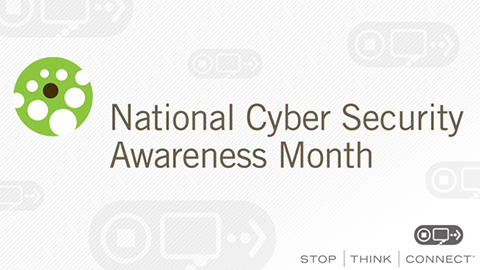UAH observes National Cybersecurity Awareness Month

The U.S. Department of Homeland Security (DHS) observes National Cybersecurity Awareness month nationally in October. In recognition of the month-long observance, The University of Alabama in Huntsville (UAH), will host a variety of events to raise online awareness.
DHS also rolled out a new cybersecurity awareness campaign for 2015 entitled Stop.Think.Connect. The website contains the latest cybersecurity news and tips to help you, your family and friends stay safe online.
UAH cybersecurity awareness events include:
- Fact or Fiction Game: Test your cybersecurity knowledge
Thursday, Oc. 15, 11:30 a.m., to 1 p.m., Charger Union. Prizes available. - Password Cracking Challenge: Learn how to make your accounts more secure
Friday, Oct. 16, 11:30 a.m., to 1 p.m., Charger Union. Prizes available. - Spot the Phishing Email Game: Can you spot a scam?
Monday, Oct. 19, 11:30 a.m., to 1 p.m., Charger Union. Prizes available. - Risk Exposure Test: Are you at risk?
Tuesday, Oct. 20, 11:30 a.m., to 1 p.m., Charger Union. Prizes available. - Cybersecurity Awareness Night
Tuesday, Oct. 20, 4 p.m. to 6 p.m., Charger Union Theater
The National Cybersecurity Awareness Month grand finale event will include speakers from a variety of backgrounds in cybersecurity. They will cover topics ranging from the history of the first cyber-espionage attacks to current trends in cybersecurity. This event is sponsored by the Office of Information Technology, the Office of Research, Professional Studies, and the Center for Cybersecurity Research and Education.
Additionally, the U.S. Department of Homeland Security offers some tips to stay safe online:
- Set strong passwords and don't share them with anyone;
- Keep your operating system, browser, and other critical software optimized by installing updates;
- Maintain an open dialogue with your family, friends, and community about Internet safety;
- Limit the amount of personal information you post online and use privacy settings to avoid sharing information widely;
- Be cautious about what you receive or read online-if it sounds too good to be true, it probably is;
Visit www.DHS.gov/StopThinkConnect to learn more about how you can help strengthen America's cybersecurity.
For more information about National Cyber Security Awareness Month 2015, visit dhs.gov.
For more information on DHS’s cybersecurity efforts, visit www.dhs.gov/cyber.
Learn More
Contact
Wendy Worlund
256.824.2616
wendy.worlund@uah.edu
